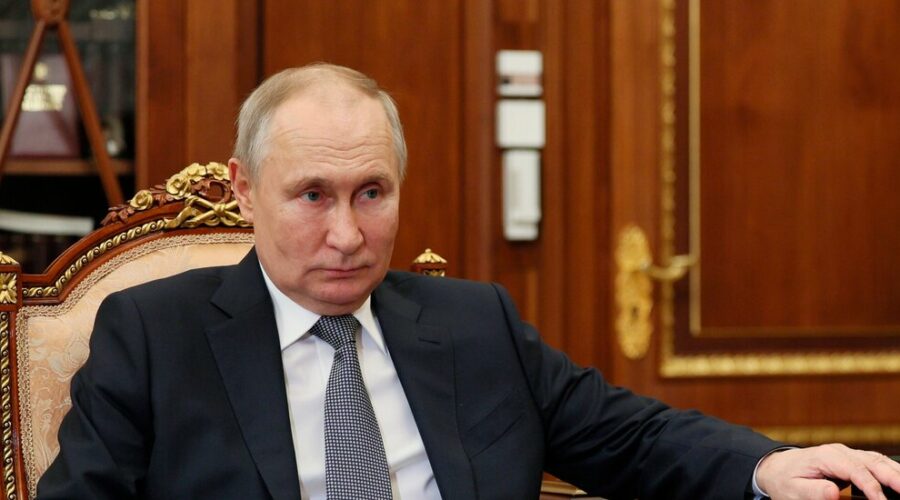The I.C.C.’s Arrest Warrant for Putin is More Than ‘Just Symbolic’
The International Criminal Court issued an arrest warrant last Friday that accused Russia’s president, Vladimir Putin, and its commissioner of children’s rights, Maria Lvova-Belova, of unlawfully deporting Ukrainian children to Russia.
Much of the coverage has focused on the things that the arrest warrant won’t do. The court, which is usually known as the I.C.C., has no police force or independent enforcement powers, so it is unlikely that Putin will actually be arrested or tried, much less convicted. That has led many people to dismiss the warrant as a mere political gesture.
But gestures can be more important than you might think. Kate Cronin-Furman, a lawyer and political scientist at University College, London, studies accountability for mass atrocities, including war crimes. In her research, she has discovered that investigations into war crimes and human rights violations can have an important effect, even if they do not lead to actual convictions or punishments for those accused.
In a conversation with me this week, she explained what the I.C.C.’s arrest warrant could do, and why she believes we shouldn’t be too quick to dismiss it as toothless symbolism.
The conversation has been edited for clarity and length.
Amanda Taub: A lot of the frustration people express to me in conversations about the I.C.C. generally, and this arrest warrant for Putin specifically, comes from an assumption that an indictment or prosecution only works if it results in a conviction and punishment.
What’s your perspective on the criticism that the I.C.C. warrant is just symbolic, and won’t lead to real accountability for a leader like Putin?
Kate Cronin-Furman: ‘Symbolic’ isn’t synonymous with meaningless. Symbols matter! And it often really, really matters to victims to see their pain validated and their abuser named. So for Ukrainian survivors, the fact that the pre-eminent international institution tasked with prosecuting those most responsible for the most serious international crimes has issued a warrant for Putin is a big deal.
And the underlying assumption of the ‘just symbolic’ critique is that the warrant itself has no independent impact, except as a step on the path to penalty, which isn’t really true. Obviously victims want to see him prosecuted and punished. (Many of them likely want to see him drawn and quartered.) But the warrant matters on its own.
Amanda Taub: Matters in ways that go beyond the symbolic value you mentioned?
Kate Cronin-Furman: In the case of the I.C.C.’s warrant for Putin, the court made the decision to publicize that, rather than keeping it under seal. Which I think is a clear indication that the court, at least, believes the warrant can have its own independent impact.
I think they’re hoping for at least three things. Reputational costs for Putin, material consequences in the form of travel restrictions, and deterrence. Probably not deterrence of the accused themselves — Putin or Lvova-Belova — but of other actors who are involved at a lower level in the crimes they’re accused of. Because the issuance of warrants suggests that more could be coming.
Amanda Taub: I think that another idea underlying the ‘just symbolic’ critique and frustration is the expectation that courts should act independently as a check on the powerful, even if it’s not politically easy. There are really prominent heroic narratives, especially in the United States, about courts being at the vanguard of social change and protections for rights.
Which then leads to a lot of disappointment and frustration when courts like the I.C.C. fail to do that.
Kate Cronin-Furman: It strikes me that perception is coming from availability bias. That’s really not characteristic of how courts operate, but it can seem like it is because we have some prominent cases where courts have led on social change. America has institutional checks and balances, and a supposedly strong norm about independent power of the judiciary, so courts there are capable of acting against power. But it’s still much, much harder than acting with it.
One example I’d point to in this respect are domestic court cases where a prosecutor (or institutional analogue) opens a case against a member of the state’s security forces for abuses against civilians, but the case goes away because the victim or witnesses are too scared to testify. We see this in the U.S. with police violence. I’ve seen it around the world with survivors of wartime sexual violence perpetrated by state militaries.
It’s a very common dynamic: Charges have been brought against a powerful actor who has committed a crime. But the court isn’t actually able to provide justice.
The I.C.C. is not unique in being at its strongest and most capable of acting where its actions align with political power. It’s just more visible there, because the I.C.C. is basically incapable of acting under other circumstances.
Amanda Taub: Because its powers are so limited that it can only act with governments’ direct assistance?
Kate Cronin-Furman: Right. Without that, it can’t get into states’ territory to collect evidence, can’t get custody of suspects, etc.
It’s hard to hold in your mind that power continues to exist, but also that institutional changes and innovations, and the brave acts of individual actors within those institutions, can chip away at power and create new realities on the ground.
But it’s more of an iterative process than a dramatic shift.
We’re not in a world where courts have the unfettered ability to hold power accountable. But we’re in a better world when a court exists that can issue a warrant for Putin for crimes against Ukraine’s children.
Thank you for being a subscriber
Read past editions of the newsletter here.
If you’re enjoying what you’re reading, please consider recommending it to others. They can sign up here. Browse all of our subscriber-only newsletters here.
I’d love your feedback on this newsletter. Please email thoughts and suggestions to [email protected]. You can also follow me on Twitter.
Source: Read Full Article

